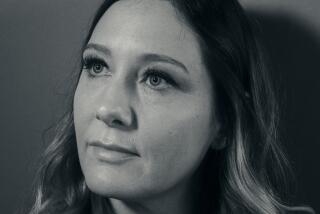Young man and ‘The Sea’
- Share via
Until now, pop singer Bjork has been Iceland’s biggest cultural export. But entering the international stage is the tiny island country’s popular Baltasar Kormakur.
The handsomely scruffy 37-year-old is a superstar in his picturesque native land. An acclaimed film and stage actor, Kormakur also has his own theater company and has directed more than a dozen plays from “The Rocky Horror Show” to “Hamlet.” And now he’s working his magic in the up-and-coming Icelandic cinema. (The country produced its first feature-length film just 25 years ago.)
Three years ago, he made his feature directorial debut with the black comedy “101 Reykjavik,” which earned him the Edda, the Icelandic Academy Award, for best screenplay and the Discovery Award at the 2000 Toronto International Film Festival. In his review, The Times’ Kenneth Turan said that Kormakur’s film found a way “to get more serious while still being true to its genial, amused sensibility.”
His first film had a limited release internationally, but that isn’t the case with his second, “The Sea,” which Palm Pictures is opening Friday in Los Angeles. “This is the first time an Icelandic film has gotten a decent distribution,” says Kormakur, over a latte at the coffee shop of a West Hollywood hotel.
Kormakur says there are quite a few young filmmakers working in Iceland. “Of course, it’s very difficult,” he said. “We have such a small audience, so it’s difficult to get financing. But there are still seven to 10 films produced year.”
“The Sea,” a gripping look at a dysfunctional family that plays out like “King Lear” meets “Hamlet,” was an even bigger success in Iceland than his first film: It became one of the top-grossing pictures ever in the country of nearly 300,000 and won the major Icelandic Oscars including best film, best director, best screenplay and all four acting awards.Based on a popular play, “The Sea” is set in a remote fishing village on Iceland’s eastern coast, where the economy is based on local fishing. But the village, as with most of the fishing communities in the country, is suffering because the aging owners of small boats are selling off their fishing quotas to larger companies in other parts of the country. The processing plants have less work to offer, and even when they do have work, the Icelanders don’t want to work with fish -- “they don’t like the smell,” Kormakur says -- so Koreans and Poles have immigrated to the country to take over these jobs.
“These are honest, hard-working people who really want to work,” the director says of these new residents. Several of the Koreans who appear in “The Sea” work in the village where it was filmed.
The ruthless patriarch who owns the main fishing company in “The Sea” refuses to sell to the big companies. But with age slowing him down, he summons his three children home to decide who will take over the business. And his brood is one messed-up lot. The oldest son, who has been overseeing the fishing plant, is weak and dominated by his alcoholic wife. The middle child, a daughter, was raped as a teenager and moved away to attend film school, eventually marrying a man she hectors. The youngest son, the father’s favorite, lives in Paris and is about to become a father. Not only do the three children hate their father, they also are hostile to their stepmother -- an aunt whom their father recently married after their mother’s death.
‘Everyone is flawed’
Although the affair over fish quotas can be a bit confusing to non-Icelandic audiences, Kormakur says that aspect of the film shouldn’t hurt “The Sea’s” chances internationally, because the main focus is on this dysfunctional family and is something everyone can relate to.
Kormakur made it a point that none of the main characters in the film was sympathetic. “There is no one good,” he says. “Everyone is flawed. That is done on purpose. It would have been easy to make the patriarch noble. But then again, I don’t want to be negative. I was also trying to care for people who do wrong things.”
Producer Joni Sighvatsson (“K-19: The Widowmaker’), who is producing Kormakur’s first English-language film, “A Little Trip to Heaven,” this fall, says the director is the torchbearer for the current generation of Icelandic filmmakers. “I think he connects to something that is very, very appealing and yet meaningful,” Sighvatsson says. “That is what both of his films have in common.”
The producer says Kormakur grew tremendously as a director between the first and second films: “The first film was all about being hip and it was cutting edge and cool. It had some nice performances, but to me, it wasn’t very substantive. What I think is very different with this film is that it tackles a serious subject. This one has a broader canvas.”
Kormakur, says Sighvatsson, also accurately captured the problems of life in Iceland and put them in “chilling” perspective. The film hit close to home for Sighvatsson, because his great-great-grandfather actually founded the village seen in the film.
“I go there regularly,” Sighvatsson says. “In this little town, there have been no houses built for five years. [The residents] have been moving away. When I go to my hometown, they are just petrified with what is going to happen if they are going to lose the quota.
“The quota was given out to people in the fishing industry to control” the catching of fish, Kormakur says. “But over time it became more valuable than the fish itself. Nobody can start fishing because it’s too expensive.” Three weeks before production started, Kormakur began rehearsal. “It is not so much about playing out the scenes in rehearsal, it is more about the motivation of the actor. What we go through is the emotion. I create back stories about the character that is not in the script, so they have a back life.”
Being an actor, says Kormakur, has been beneficial to him as a director. “I know what it’s like to be standing on a set or in a situation,” he says. “What seems to be very simple can be complicated for an actor to do. But I never try to impose theory or my style of work on actors. I just try to understand them and get the best from them.”
More to Read
Only good movies
Get the Indie Focus newsletter, Mark Olsen's weekly guide to the world of cinema.
You may occasionally receive promotional content from the Los Angeles Times.









